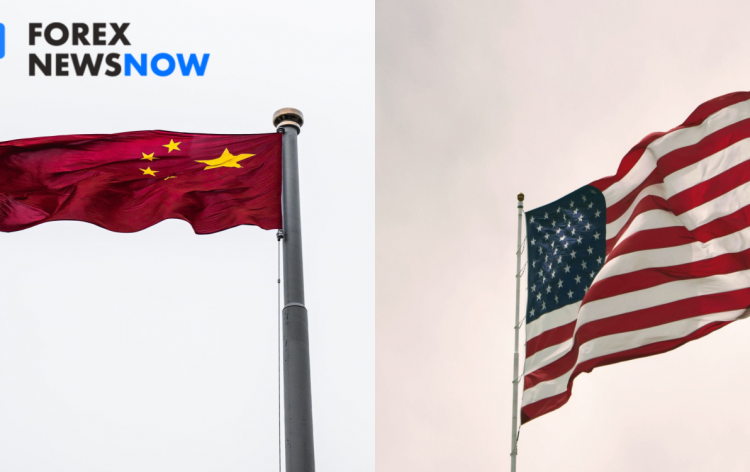Decoding China’s Trade Claims: How U.S. Policies Impact the Bilateral Economic Landscape

In a growing economic discourse, China has asserted that the recent decline in trade relations with the United States is not a mere coincidence, but rather a result of deliberate actions taken by the U.S. This assertion comes amidst a backdrop of shifting global trade dynamics and geopolitical tensions. As trade figures continue to reflect a noticeable drop, China’s stance raises important questions about the complex interplay between economic policy, international relations, and the evolving strategies of major players on the global stage. This article delves into China’s perspective, examining the perceived ‘direct consequences’ of U.S. decisions on the intricate fabric of international trade.
China’s Ambassador Points to U.S. Policies as Catalyst for Decline in Trade: A Look at Xie Feng’s Insights
China’s Ambassador to the U.S., Xie Feng, has attributed the decline in trade between the two economic giants to a series of U.S. actions, predominantly tariffs and export controls. Xie’s remarks were delivered via video during the Forbes U.S.-China Business Forum in New York and were subsequently published online by the Chinese embassy in the U.S.
Highlighting the stark drop in China-U.S. trade by 14.5% in the first half of the year compared to the previous year, Xie squarely pointed fingers at the consequences of U.S. decisions. He stated that the imposition of Section 301 tariffs on Chinese imports, the application of unilateral sanctions, and the tightening of export controls had directly led to this downturn. In his words, “Livelihoods of many families have been affected, and businesses from both countries have borne the brunt.”
Despite the recent figures, the U.S. remains China’s foremost trading partner on an individual country basis. However, the trade data continued its downward trajectory, with July witnessing a further 15.4% decrease in U.S.-China trade from the same period in the preceding year, according to China’s customs data.
Xie expressed concerns about the potential for a decoupling between the two economic giants, emphasizing that such a scenario would result in missed opportunities, instability, and halted cooperation. The ambassador underscored the importance of mutual economic cooperation and trade expansion, proposing measures like facilitating travel between the nations and renewing collaboration agreements in science and technology.
Xie also highlighted China’s robust global position in trade and industries like electric vehicles, noting increased foreign investment from countries like France, the U.K., and Japan in the first half of the year. He pledged to enhance the protection of foreign investment and ensure equitable treatment for foreign-invested enterprises.
U.S. Commerce Secretary Gina Raimondo’s recent visit to China was a point of interest for Xie’s remarks. Following discussions with Chinese officials, both nations agreed to establish regular communication channels regarding commerce, export controls, and trade secrets protection. Raimondo’s assertion that matters of national security were non-negotiable underlined the ongoing tensions between the two nations.
Xie’s presentation also addressed the disparities in tariff rates, highlighting that average U.S. tariffs on Chinese products were notably higher than those on U.S. goods entering China. He criticized the U.S.’s recent executive order aimed at restricting investments into certain Chinese sectors as contradictory to the principle of free trade.
As China and the U.S. navigate these challenges, their trade relationship stands at a crossroads, one where economic cooperation and stability seem to hang in the balance.
Why You Should Take Into Account Recent News from China-US Trading Relationship?
Traders facing the intricate web of China-U.S. trade dynamics should adopt a multifaceted approach to navigate the evolving situation. The insights provided by China’s Ambassador Xie Feng shed light on the complexities influencing global markets. Firstly, traders should meticulously monitor the announcements and actions of both nations, particularly regarding tariffs and export controls. These policy shifts can swiftly reverberate across sectors, impacting supply chains and market sentiment. For instance, a sudden imposition of tariffs on a certain category of goods can lead to price fluctuations and affect related industries, such as manufacturing and retail.
Secondly, traders need to grasp the broader geopolitical context. The potential for a decoupling between the two economic giants presents significant risks and opportunities. Market reactions could be swift, and sectors with high dependence on China-U.S. trade should be closely scrutinized. Technology, automotive, and consumer electronics sectors, for instance, might be particularly susceptible to disruptions.
Furthermore, traders should consider the varying responses of other major economies. The European Union, the Association of Southeast Asian Nations, and other trade partners have experienced trade declines as well. This interconnectedness suggests a ripple effect across global markets. Traders should anticipate the possible impacts on international supply chains, demand patterns, and commodity prices.
Lastly, diplomatic efforts and communication channels between China and the U.S. deserve attention. Any signs of collaborative approaches or easing of tensions could lead to more stable market conditions. Conversely, escalation might cause market volatility. For instance, agreements related to technology transfer or intellectual property rights could significantly impact technology companies’ valuations.
In conclusion, traders should employ a proactive strategy that combines vigilant monitoring of policy shifts, an understanding of global market interconnections, assessment of sector-specific vulnerabilities, and awareness of diplomatic developments. This multifaceted approach equips traders to seize opportunities and mitigate risks amidst the evolving China-U.S. trade landscape.


























Comments (0 comment(s))